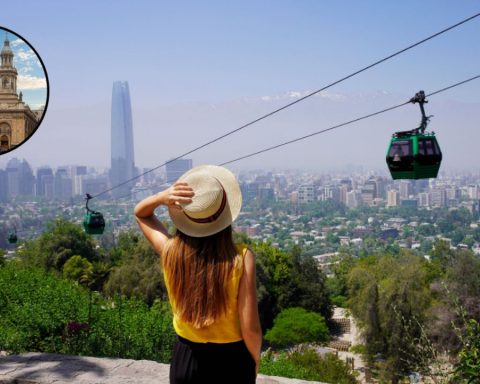President Gabriel Boric called to turn the page, after receiving a series of criticisms for the pardons granted to 13 people (12 in the context of the acts of violence registered during the social outbreak and the ex-frontist Jorge Mateluna), after being consulted about the case of one of those pardoned; Louis Castillo.
Luis Arturo Castillo Opazo, 37, was sentenced to 4 years in prison in its maximum degree for the crimes of disorder and robbery in an uninhabited place in November 2019. However, according to a report by Channel 13, Castillo Opazo would also have five convictions and 26 cases against him. According to the aforementioned medium, these are crimes of theft, injuries, robbery with violence and robbery with surprise, all carried out between 2005 and 2017.
You may also like:
During a press point in Valdivia issued by the Head of State, the journalist Valentina Godoy asked the President if he had said precedents on the table when granting the pardon. President Boric said that the issue of pardons throughout Chile’s history “has always been controversial.” And, along with citing the book Las Suaves Cenizas del Olvido (Loveman and Lira, 1999) where “he realizes how this has been an institution that has existed for a long time in the Republic”, he stated that it is a subject of “always generates very acrimonious debates”.
President Gabriel Boric stressed what he had already mentioned previously. “I do not doubt for a second the powers of the Judiciary, nor is it my responsibility to interfere in what is indicated in article 76 of the Constitution, regarding the exclusive power to hear pending cases belongs to the Judiciary and therefore does not I must refer to the failures,” he reiterated.
“The pardon is an attribution to which we have resorted, by virtue of the faculties that the Constitution and the laws confer on me. And I hope that it will serve to repair open wounds in the country,” the President sentenced. In addition, he reviewed security measures that have been taken to date, such as the increase in the budget for the Carabineros, the increase in powers for the PDI, the classification of the crimes of extortion, kidnapping, hit men, and affirmed “that crime and how to confront it have always been a concern.
The pardons granted on December 30, said President Boric, “have been the result of a deep reflection, where I do not question the role of the State Powers and I hope this does not mean that we cannot work as a country to face this tremendous challenge that is deal with crime.”
From the Los Ríos Region, Boric finally maintained that he has already repeatedly referred to the issue of pardons and hopes that it will be “an issue that we can consider settled, that we turn the page forward and dedicate ourselves to working for urgent needs that our country has that are many”.
The President was once again consulted to see if he knew all of Luis Castillo’s background, to which he reiterated: “I have already answered the question, I have already answered the question.”
“The pardons are applied, and there is no other way, on convicted persons”
The person who also addressed the issue was the head of the General Secretariat of Government, the spokesperson Camila Vallejo, assuring that the decision to pardon the people was made under “reflection” and with “review of the background”.
“The pardons are applied, and there is no other way, to convicted people. It is not a surprise and it cannot be a surprise that these people have had convictions, because each of the pardons is applied to convicted people. They are difficult decisions, but they are They are done after reflection, with a background check, and that is how they have been applied,” said Vallejo.
For her part, the Minister of Justice, Marcela Ríos, explained that “pardons do not eliminate the criminal conviction, these people continue to be sentenced, they continue to have criminal records and one may always have had differences when pardons have been delivered.”
“Our sector strongly cited President Piñera’s pardons for criminals against humanity and at other historical moments they have also been questioned,” argued the Secretary of State.
Regarding Castillo’s case, Minister Ríos said that “all legal regulations have been complied with.” “Here there is no excuse from anyone, because this is a pardon, a pardon, and it does not mean that that person no longer has a conviction by the Judiciary,” she said.
The Minister of the Interior and Public Security, Carolina Tohá, added in another press outlet that “every time someone is pardoned, someone convicted is being pardoned. Pardons are neither security policies nor do they replace judicial processes.”
“The only people who receive pardons are people who have been sentenced, they are people who have been reproached by justice and they are people who, because they are pardoned, do not stop having that reproach,” the chief of staff pointed out.
Finally, Tohá pointed out that “those sentences are still valid, the processes are not in question, but there is an exceptional retribution that is given to presidents so that they, in an evaluation, can consider when it corresponds or is appropriate that that person does not She’s still in prison, but she’s still convicted and still responsible for a crime.”
Bench of UDI Deputies officializes the Comptroller’s Office to review the legality of the pardon for Jorge Mateluna and Luis Castillo
The deputies of the UDI, Felipe Donoso and Juan Manuel Fuenzalida, on behalf of the trade union bench, announced that they will officiate at the Office of the Comptroller General of the Republic to rule on the legality of the pardon granted by President Gabriel Boric to Jorge Mateluna and Luis Castle. In addition, they will request the Chilean Gendarmerie for the conduct sheet of those pardoned.
Donoso recalled that “the pardons given by the president break with a tradition, since they were normally for people who were in a serious state of health, who had some characteristic that made the pardon humanitarian.”
In the pardons granted to Mateluna and Castillo, he added, they require, as established by law, to justify this “pardon”, which in this case, in his opinion, did not happen. “This did not happen in the case of Jorge Mateluna, nor in the case of Luis Castillo, who have been sentenced for various events over the last 20 years,” said the UDI deputy.
“The Comptroller’s Office has the capacity and is obliged to do so, we hope that the Comptroller will process it as quickly as possible so that this is reversed and thus we do not have criminals who have already committed several crimes released, due to an irresponsible decision of a minister and the President of the Republic”, mentioned Donoso.
Meanwhile, Deputy Fuenzalida maintained that they are also going to request and officiate the Chilean Gendarmerie to deliver the conduct sheet for Mateluna and Castillo.
“We have learned that Mr. Castillo, both in the Huachalalume prisons and the Copiapó prison, was in the highly dangerous module and therefore we are going to officiate not only in what is the resume, but also his affiliation as accused and sentenced within the penitentiary compound and also all the criminal acts that he could have committed inside”, exposed the unionist parliamentarian.
















